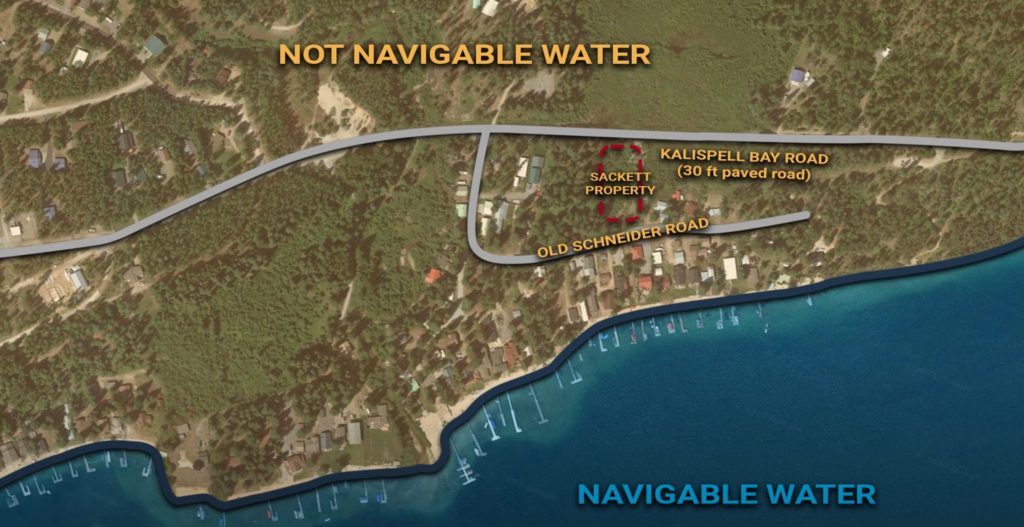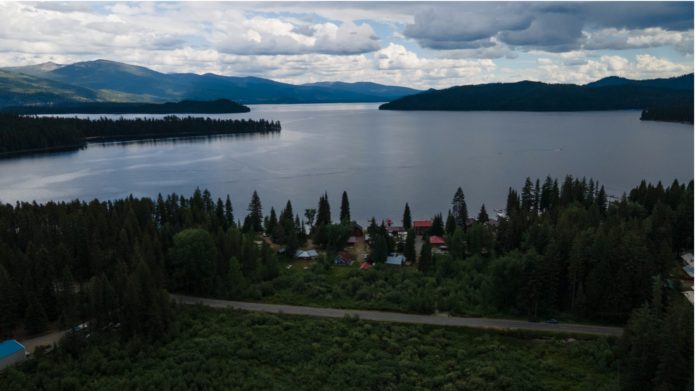A case that has strong implications in wetlands-rich Alaska has made it to the U.S. Supreme Court calendar and will be the first case heard by the high court when it convenes on Monday, Oct. 3, for its 2022-2023 term.
The case is Sackett v. EPA and stems from a lawsuit brought by a family in Idaho who was prevented in 2007 by the EPA from building a home on a piece of property that they bought in 2004 in a residential subdivision near Priest Lake, where other homes were built. The Sacketts paid $23,000 for their non-waterfront lot and had received all their local building permits, when the EPA swept in and locked up the land, declaring it a navigable waterway that falls under federal jurisdiction.
This will be the second time the case has gone before the Supreme Court. The Sacketts won a 9-0 victory at the Supreme Court in 2012, in which the court said they had a right to have their case heard by lower courts. That was 10 years ago. Now, nearly two decades after they purchased their land, they will get to argue before the Supreme Court that they have a right to build their home without having to get federal Clean Water Act permits.
The EPA, in its order to stop the ground work they were doing on their property that is 300 feet from the lake, claimed the Sacketts’ construction violated the Clean Water Act because the land was federally regulated “navigable water.” The EPA provided no proof that the land was actually navigable water.

Former Alaska Gov. Sean Parnell was the first governor to file a legal brief on behalf of the Sacketts.
The Sacketts are being represented by the Pacific Legal Foundation. Since the Supreme Court’s ruling, the Sacketts’ dispute “has languished in lower courts without resolution. The only progress in the decade since has been the EPA’s removal of the compliance order in 2020,” wrote the foundation.
“With the question of federal jurisdiction—and their homebuilding dreams—still in limbo, the Sacketts are returning to the Supreme Court. This time, they’re asking the court to clarify the scope of the EPA’s regulatory powers under the CWA. At stake is whether the EPA can expand the definition of “navigable waters”—which limits their authority—to include any semi-soggy parcel of land in the country,” the legal nonprofit wrote.
“A win would vindicate the Sacketts’ right to finally build their home and the rights of all landowners to make reasonable use of their property without abuse by overzealous federal regulators,” the foundation wrote.
EarthJustice disagrees, and has filed its own briefs in this case.
“The Sacketts’ case against the EPA, however, is not about a parcel of land, let alone a lake house, but is a coordinated push by industry polluters that want to blow a hole in the Clean Water Act, bulldoze cherished wetlands, and contaminate the country’s streams with waste from mining, oil and gas, and agro-industrial operations as they see fit, just to maximize their profits,” EarthJustice wrote.
Earthjustice’s amicus brief is on behalf of 18 tribes. “We will continue fighting to uphold and strengthen the Clean Water Act,” the group wrote.

The Imperial Federal Government needs to be brought to heel. Hard.
The land should have never been able to buy or sell if the feds had their heads up but no they are power hungry. The land should belong to the states and very minimal land for the feds.
Hardliners at the EPA won’t be satisfied until a Federal permit is required for any building or modification anywhere in these United States.
Technically, if you go far enough straight down or diagonally, you will eventually touch water that winds up in a “navigable” waterway.
So water isn’t land, and you can navigate a watercraft on land? Wait do words have meaning still against the will of leftists?
The Cambridge Dictionary defines land as:
the surface of the earth that is not covered by water
The Cambridge Dictionary defines water as:
an area of water, such as the ocean, a lake, or a swimming pool
The Cambridge Dictionary defines navigable as:
(of an area of water) deep, wide, or safe enough for a boat to go through
Presumably, given the dictionary definition of navigable and water and land, we can say that this land wasn’t and isn’t navigable water.
Look for another 9-0 SCOTUS decision. Just like both Sturgeon decisions were unanimous, this will be as well. It’s unfortunate that it has taken two decades to get to this point, we might well ought to be thinking about how roughshod some folks run over other people’s rights in this country.
The EPA was recently given “unbridled” authority and a huge budget increase. This will be a huge bucket of cold water on any development project in the U.S. Even if you have obeyed every regulation and obtained every permit, they can shut you down.
I believe the issue is not navigable waters, it is if Federal government has jurisdiction over private wetlands that are not contiguous to navigable wetlands, or only contiguous during flood events. Their is a subtle distinction as any ground beneath navigable streams belongs to the Federal government.
The issue is the EPA tried to change the definition of “navigable waters” and “waters of the United
States” without the authority to do so. I’m not sure where you get the impression that any ground beneath navigable streams belongs to the federal government as it is completely false.
I suspect this is more complex than ‘to change the definition of “navigable waters”‘ Steve-O. It appears to relate to wetlands, rather than navigable waters but we will get to see the results in due time.
There are specific rules to filling wetlands (no heavy equipment allowed but hand tools are fine) but the courts may choose to alter this. Navigable waters is no-where the issue here IMO.
Would you want private property owners to be able to fill any wetlands by any means? And why?
Bill,
I see you’re still having the same reading issues you’ve always struggled with, you should reread what I wrote again, just make sure you read the entire sentence and not just seven words out of a twenty-five word sentence. This case has to do with exactly what I said, which is much more than the quote you chose to use…regardless of your clearly mistaken opinion.
Your 25 word sentence was more of a simplification of this case IMO Steve-O and we will get the chance to see what happens eventually. Few cases that go on as long as this one are as simple as you suggest but, of course, you know “exactly” what’s going on. Heheh!
Bill,
I’m glad you figured out that my 25 word sentence was a simplification of the case, if you want a more in depth look into what I said there’s plenty out there. You can read more about it here ‘https://eelp.law.harvard.edu/2022/06/sackett-v-epa-and-the-definition-of-waters-of-the-united-states/’ or just look up the original SCOTUS decision for yourself and see that it is very much about the changing of the definition of “navigable waters” and “waters of the United States” and who has the authority to do the changing.
Here is an article on this subject that has no mention of “navigable waters,” but they hadn’t spoken to you before hand. Heheh!
‘https://www.msn.com/en-us/news/politics/supreme-court-debates-narrowing-protections-in-clean-water-act/ar-AA12yiJW?ocid=iehp&li=BBnb7Kz
Bill,
Poor poor Bill,
The 20th paragraph reads as follows:
The Sacketts’ attorney Damien M. Schiff asked the court to embrace the narrow interpretation proposed by Justice Antonin Scalia, the late conservative. Scalia’s definition limits regulation to wetlands with a direct “continuous surface connection” to “navigable waters.”
The article you present, that you claim makes no mention of navigable waters does in fact makes mention of navigable waters, it also makes mention of waters of the United
States…both of which were mentioned in my 25 word simplification of the case.
Stick with the practice, Bill, one of these days you’ll get the hang of this reading thing!
Attached are the current regulations. ‘https://www.perc.org/2020/01/28/the-new-navigable-waters-protection-rule-explained/
Frank,
The “new navigable waters protection rule” has been replaced with the pre 2015 rules so the “new navigable waters protection rule” aren’t the current regulations, the old rules are the new rules… ‘https://www.epa.gov/wotus/final-rule-navigable-waters-protection-rule’
Correction, substitute “belongs to” to ” is regulated by”
Outside of Columbia Missouri, adjacent to the Missouri River, there used to be miles and miles of Good rich bottom farmland. The levee system for the most part was good and kept the river at Bay. Then in 1993 when the Mississippi flooded and all the feeder Rivers went out of their Banks as well, the landowners we’re forced to no longer farm the land and now it is classified as wetlands where no one can build on it or not even farm it anymore. I think the federal government was paying out insurance money every time it flooded and they decided enough is enough.
The proper response from the property owners to the demands of the EPA should have been, Fxxx you, we are building our home. That they’ve been delayed for decades because some moron bureaucrat doesn’t know what navigable water is is clearly unacceptable. In situations like this- with decades-long court battles- even if the property owner wins, they lose. If the EPA wanted to push this criminally, you get the case in front of a jury. A jury would know the difference between land and navigable water and laugh the EPA our of the courtroom. Even a rookie US attorney would know this.
Don’t expect that from the dems or repubs. Lord they built that bureaucracy and often hide behind it.
I learned long ago that you do not cross EPA. These bureaucrats have an arsenal of thousands of obscure regulations scattered throughout the federal register that they smugly pull out to enforce their activist agendas.
Earthjustice is run by a bunch of brainwashed freaks…….products of dubious antecedents who worshipped communism in the 60’s and stayed drugged-up during their adult lives. Earthjustice is a super radical outfit of free-love misfit hippie progenitors who accomplished nothing in their sad lives. Total non-productive users of society, and jealous of those who actually do something with their lives.
Their “donate” button is they’re there………….
At some point, someone, somewhere, will have the ability and charisma to teach John Locke’s social contract.
If you’re familiar with it, live it. If you’re not familiar with it, become so. Once you understand it, share it.
A government rules only by consent, and when it fails to follow the interests of society and fails to respect the rights of it’s citizens, the citizens have a natural right to overthrow it.
It was popular reading at one time. John Stuart Mill is another good one.
Comments are closed.